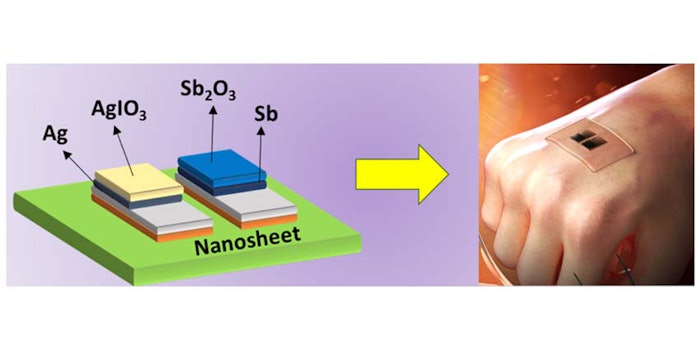
Researchers from Tokai University in Japan have published on an electronic skin sensor that detects pH to warn the wearer of potential heatstroke.
According to the inventors, the pH of skin or sweat significantly changes as the body dehydrates. However, current skin pH measurement techniques require a long testing period, rigid electronics and high number of sweat samples. Monitoring skin pH levels “on the go” is especially of interest to reveal real-time body conditions.
The Device
In response, a freestanding polydimethylsiloxane (PDMS) nanosheet skin patch consisting of the pH-sensing elements antimony/antimony oxide and silver/silver iodate was designed to achieve high pH sensitivity and repeatability. According to the university, the idea is the voltage difference between these two electrodes changes according to the pH of the sweat that accumulates near them, providing a straightforward way of determining sweat pH in real-time. The device is described in greater detail in the ACS Sensors article.
Next Steps
As a next step, the research team aims to improve the performance of the device with mass production in mind. If many people regularly use sensors that monitor certain bodily parameters, including skin pH, it will be easier for researchers to obtain large-scale data to better understand how environmental factors including temperature and humidity affect body parameters when influenced by personal factors such as living environment, ethnicity and age.
'This nanosheet pH sensor technology could be the next frontier in personalized skin care technology.'
Prof. Kazuyoshi Tsuchiya, a co-author on the study, said, “In the future, we will combine data from the weather ... and from the Japan Meteorological Agency to conduct a multifaceted analysis to demonstrate the relationship among heatstroke, environmental factors and the pH of sweat.”
Extended Applications
Ganesh Kumar Mani, another co-author on the study, noted the PDMS-based platform could be adapted for other purposes. “We expect the obtained results to have implications in a variety of biomedical fields. The proposed process could be useful for functionalizing PDMS nanosheets with a wide variety of materials for multifunctional applications. This nanosheet pH sensor technology could be the next frontier in personalized skin care technology,” said Mani. For now, the scientists are making further improvements in the adhesion of the sensor to skin.
This invention's basis in pH is reminiscent of a previously described wearable designed by researchers at the National University of Singapore to detect skin wellness indicators. Here, variations in sweat were reported to aid in the diagnosis of conditions such as dermatitis, acne and skin infections. Perhaps these could be additional applications for the described PDMS nanosheet sensor.










